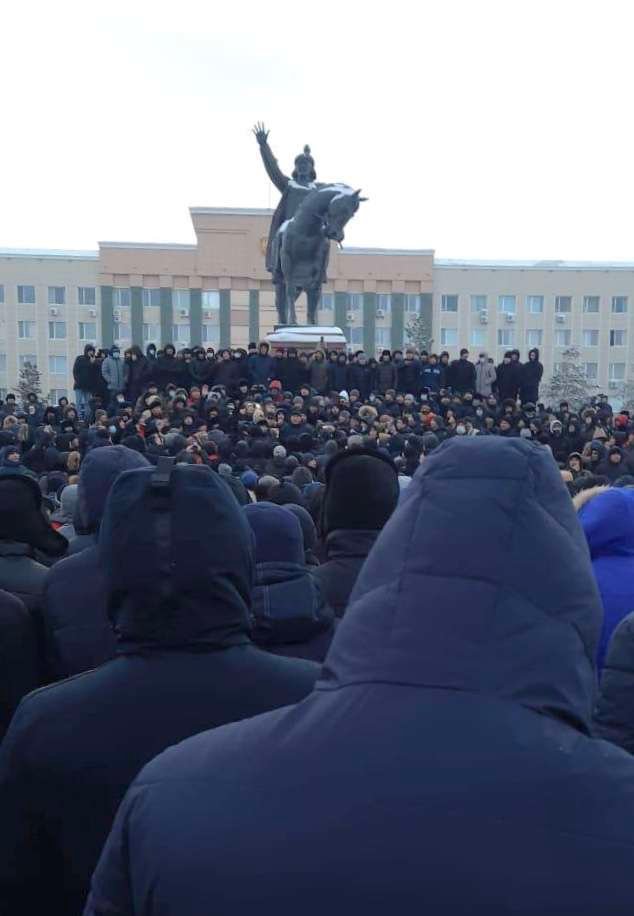5 January, 2022
The international community should urgently impose personal sanctions on the Kazakhstani authorities to avoid bloodshed and an increase in mass repression of peaceful protesters.
In Kazakhstan, since 2 January 2022, tens of thousands of people have gone on peaceful anti-government protests in Zhanaozen. There are both social (lower gasoline and food prices, higher wages), and political slogans (“shal, ket” – the change of Nazarbayev’s regime, the dismissal of the government, the release of political prisoners) among the demands of the protesters.
On 3 January 2022 the citizens of nearby villages and towns of the Mangystau region joined the Zhanaozen movement. The peaceful opposition movement “DCK” called on the people of Kazakhstan to join the protests on 4 January 2022 and support the demands of the residents of the Mangystau region. As of 5 January 2022, tens of thousands of citizens from more than 40 cities and settlements of Kazakhstan went on peaceful protests.
In response to the mass peaceful protests, the authorities of Kazakhstan once again used political repression: illegal surveillance, detentions, administrative arrests of prominent activists, human rights activists, and former political prisoners.
On 5 January 2022, the Ministry of Internal Affairs reported the “detention of over 200 violent citizens in Almaty, Shymkent and Taraz”. The Ministry said that “as a result of unlawful actions, 95 police officers were injured and 37 official vehicles were damaged”.
The authorities’ claims about provocateurs are an attempt to cover up the mass repression and suppression of peaceful anti-government protests in Kazakhstan. The human rights monitoring group “ActivistsNotExtremists” documented between 2 and 5 January:
– footage of the use of armoured and military vehicles, tear gas and smoke bombs to block, disperse peaceful protests in Almaty and other cities;
– blocking of mobile phone services, the internet and social media in cities and towns where mass protests are taking place;
– hundreds of cases of unjustified use of brute force by law enforcement agencies against peaceful protesters (human rights volunteers are unable to process information in time, many messages arrive late due to communication blockages);
– according to eyewitness reports, there is video footage on 5 January 2022, where SOBR officers refused to carry out criminal orders against civilians, lowered their shields and marched to the Akimat (office of the city governor) in Almaty together with participants of the peaceful protests;
– in various cities in Kazakhstan, journalists and bloggers who were broadcasting from the scene were persecuted by unmarked police and SOBR officers; – on 4 January 2022, videos were distributed on social media of police cars set on fire and aggressive youths carrying out a violent riot in places where peaceful protesters gather in Almaty, Shymkent and Taraz. The human rights monitoring group “ActivistNotExtremists” has obtained eyewitness reports and video footage of protesters also being heard speaking out against the vandalism by unknown perpetrators. According to eyewitnesses, police officers did not interfere with the vandals. Among the vandals, representatives of the criminal group of Wild Arman (Arman Dzhumageldiyev), which is under the control of the NSC, were recognised.
The unimpeded filming of such videos for “bloggers” by the police, as well as the massive information flow of such videos with the context of presenting peaceful protesters as “aggressively minded citizens” in the pro-government media and public pages in Kazakhstan gives every reason to claim that the authorities are making a deliberate attempt to discredit the peaceful anti-government protests.
The same method was used to discredit peaceful protests in the Mangystau region in 2011. Police officers and NSC-controlled criminals were then used to stage provocations and justify the imposition of a state of emergency in the Mangystau region. Subsequently, the testimony of victims of political repression and mass torture revealed that the state of emergency and organised provocations were used for mass torture, politically motivated criminal cases and the shooting of civilians.
Similarly, as during the repression in Zhanaozen, immediately after the provocations at the sites of peaceful protests, an official statement of President Tokayev of Kazakhstan was released on the imposition of a state of emergency in Almaty, Almaty Region and Mangystau region from 1:30 on 5 January until midnight on 19 January 2022.
On the morning of 5 January, President Tokayev announced “the resignation of the government” and blamed the Ministry of Energy as well as “KazMunaiGaz” and “QazaqGaz”. Tokayev remained silent about Nazarbayev and his son-in-law Timur Kulibayev, who ran the government and companies personally. Tokayev also did not comment on the use of military equipment and the military officers against peaceful protesters, the blocking of social networks, the internet, mobile phone services, and mass persecution.
Given the above, we urge:
The international community to impose personal sanctions on Nursultan Nazarbayev and his inner circle Karim Massimov, Yerlan Turgumbayev to prevent a bloodshed following the Zhanaozen scenario. Political killings, abductions, criminal prosecutions and torture over the past 11 years remain uninvestigated. The impunity of the Nazarbayev’s regime and the perpetrators of criminal orders must be stopped.
Human Rights Protection Fund “Qaharman”
Human Rights Movement “405”
Human Rights Movement “Veritas”
Human Rights Movement “Elimay”
Human Rights Movement “Article 14”
Human Rights Initiative “Femina Vertute”
Human Rights Initiative “BostandyQ Kz”
Human Rights Foundation “Open Dialogue”
Human Rights Protection Fund “Freedom Kazakhstan”
Italian Federation for Human Rights (FIDU)
Public Foundation “We Against Torture”
American Russian-speaking Association for Civil & Human Rights


